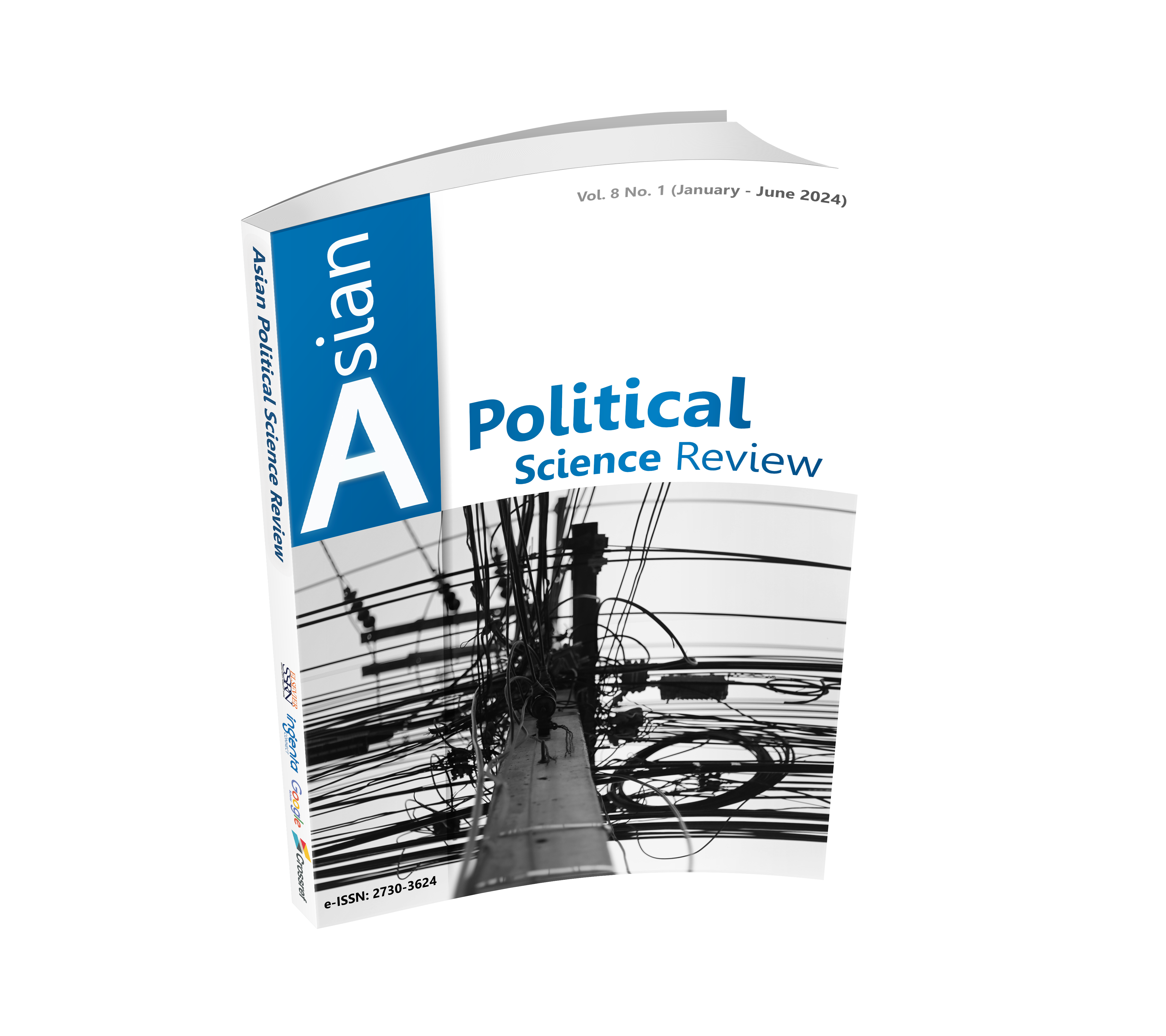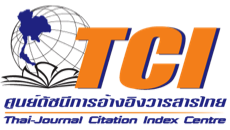ORGANIZATIONAL CITIZENSHIP BEHAVIOR OF THAILAND’S PRIME MINISTER'S OFFICE PERSONNEL AND THE POLICY RECOMMENDATIONS FOR DEVELOPMENT
DOI:
https://doi.org/10.14456/apsr.2024.2Keywords:
Organizational Citizenship Behavior, Happy Workplace Administration, Job Satisfaction, Perceived Organizational Justice, Organization CommitmentAbstract
The objectives of this research were 1) to study the level of happy workplace administration, job satisfaction, perceived organizational justice, organization commitment, and the organizational citizenship behavior in Thailand’s Prime Minister’s Office, 2) to examine the influence of happy workplace administration, job satisfaction, perceived organizational justice, organization commitment, and the organizational citizenship behavior, and 3) to propose policy recommendations for the development of the organizational citizenship behavior in the office. The research findings revealed that the model of organizational citizenship behavior in the Prime Minister’s Office is consistent with the empirical data, considering Chi-square = 0.246, df = 1, p = 0.620, GFI = 1.00, AGFI = 0.996, CFI = 1.000, SRMR = 0.003 and RMSEA = 0.000. The variable that had the greatest influence on the organizational citizenship behavior was perceived organizational justice, followed by job satisfaction, happy workplace administration, and organization commitment, respectively. All variables were combined to predict the organizational citizenship behavior by 45.80%. The policy recommendations for the development of organizational citizenship behavior in the Prime Minister’s Office must primarily focus on justice. The mentioned justice process shall consist of 3 components: transparency, justice, and accountability.
Downloads
References
Agustina, G., Permanar, T., Nurhayati, S., Ahman, E., & Febrian, F. (2020). Happiness at Work and Organizational Citizenship Behavior in Krakatau Steel. Dinasti International Journal of Digital Business Management, 1(5), 911-920.
Akaraborworn, C., & Akaraborworn, P. (2015). Lessons from reforming the public administration system to prepare for the opening of the ASEAN Economic Community. Suratthani Rajabhat Journal, 2(1), 1-25.
Akçakanat, T. (2020). The Effect of Happiness at Work on Organizational Citizenship Behavior: The Role of Intrinsic Motivation and Resilience. In E. Baykal (ed.). Handbook of Research on Positive Organizational Behavior for Improved Workplace Performance (pp. 179-200). Pennsylvania: IGI Global.
Al-shami, S., Al-mamun, A., Rashid, N., & Cheong, C. (2023). Happiness at workplace on innovative work behaviour and organisation citizenship behaviour through moderating effect of innovative behaviour. Heliyon, 9(5), e15614.
Boomsma, A., & Hoogland, J. (2001). The Robustness of LISREL Modeling Revisited. In R. Cudeck, S. du Toit, & D. Sörbom (eds.). Structural Equation Models: Present and Future (pp. 139-168). Illinois: Scientific Software International.
Chaikot, C. (2017). Thai Public Administration. Bueng Kan: UdonThani Rajabhat University, Bueng Kan Education Center.
Essien, E., & Ogunola, A. (2020). Workplace Fairness and Organisational Citizenship Behaviour: Implications for Nigerian Employees. Islamic University Multidisciplinary Journal, 7(1), 111-124.
Fisher, C. (2010). Happiness at Work. International Journal of Management Reviews, 12(4), 384-412.
Isranews. (2022). 'Move Forward' promotes 23 policies to combat corruption Aiming at dismantling the 'government-police' system. Retrieved from https://www.isranews.org/article/isranews-short-news/114313-isranews-970.html.
Jantasang, S. (2023). The Causal Relationship Model among Emotional Intelligence, Job Satisfaction and Organizational Commitment Influence Organizational Citizenship Behavior of Academic Support Personnel. Journal for Research and Innovation, Institute of Vocational Education Bangkok, 6(1), 19-39.
Kamalan, K., & Sutha, J. (2017). Influence of Fun/Entertainment at Workplace on Employee Performance in Sri Lankan IT sector. Scholars Journal of Economics, Business and Management, 4(11), 739-748.
Khumkong, W. (2021). The Operational Efficiency of Personnel at Local Government Organizations, Si Prachan District, Suphanburi Province. Master of Public Administration Research Paper, Mahachulalongkornrajavidyalaya University.
Kittinorarat, J. (2022). The Antecedents of Happiness at Work and Its Impact on Organizaional Citizenship Behavior Among Staff in Public Higher Education Institutions in Thailand. PSAKU International Journal of Interdisciplinary Research, 11(2), 19-32.
Luecha, T., & Yoongtomg, K. (2017). Concept and Measurement of Happiness at Work. Phetchabun Rajabhat Journal, 19(2), 9-18.
Nadiri, H., & Tanova, C. (2010). An investigation of the role of justice in turnover intentions, job satisfaction, and organizational citizenship behavior in hospitality industry. International Journal of Hospitality Management, 29(1), 33-41.
Nakro, C., & Iamsupasit, S. (2020). The Relationship between Perceived Organizational Justice, Relations with Supervisors and Organizational Citizenship Behavior of Employees in Private Company by Organizational Commitment as a Moderator. Journal of Humanities and Social Sciences Valaya Alongkorn, 15(2), 83-98.
Namdej, P., Rattanasirivilai, S., & Rathachatranon, W. (2023). Factors Influencing Organizational Citizenship Behavior of Government Officials: A Conceptual Framework. A paper presented at the 21st International Social Sciences and Business Research Conference, University of Northampton, England.
Na-nan, K., Kanthong, S., & Joungtrakul, J. (2021). An Empirical Study on the Model of Self-Efficacy and Organizational Citizenship Behavior Transmitted through Employee Engagement, Organizational Commitment and Job Satisfaction in the Thai Automobile Parts Manufacturing Industry. Journal of Open Innovation: Technology, Market, and Complexity, 7(3), 170.
Pengsuwan, P. (2016). Reform Policy in the Context of Thai Bureaucracy: Implementation and Barriers. NIDA Development Journal, 56(3), 33-67.
Prachachat. (2019). Major dismantling of the civil service structure Adjust the salary system-attract new people. Retrieved from www.prachachat.net/general/news-398338.
Prime Minister’s Office. (2002a). Authority. Retrieved from www.opm.go.th/opmportal/index.asp?pageid=1629&parent=1629&directory=12163&pagename=content1.
Prime Minister’s Office. (2002b). Authorities of the Prime Minister’s Office. Retrieved from www.opm.go.th/opmportal/index.asp?pageid=1629&parent=1629&directory=12152&pagename=content1.
Rahman, M., & Karim, D. (2022). Organizational justice and organizational citizenship behavior: the mediating role of work engagement. Heliyon, 8(5), e09450.
Sananuamengthaisong, M. (2022). The Effect of Job Satisfaction, Organizational Commitment, and Organizational Citizenship Behavior on Effectiveness of Electrical Parts Industries in Thailand. Journal for Strategy and Enterprise Competitiveness, 1(2), 17-27.
Sangperm, N. (2018). Structural Equation Model Cause of Organizational Citizenship Behavior of Personnel of Kasetsart University Sriracha Campus, Thailand. PSAKU International Journal of Interdisciplinary Research, 7(1), 31-41.
Schumacker, R., & Lomax, R. (2010). A beginner’s guide to structural equation modeling. 3rd ed. New Jersey: Lawrence Erlbaum Associates.
ScienceDirect. (2023). Find articles with these terms "Organizational Citizenship Behavior". Retrieved from www.sciencedirect.com/search?qs=%22Organizational%20Citizenship%20Behavior%22.
Shimamura, M., Fukutake, M., Namba, M., & Ogino, T. (2021). The relationship among factors of organizational justice, organizational citizenship behavior, job satisfaction, and ease of work among Japanese nurses. Applied Nursing Research, 61, 151479.
Tantitumrongwut, S., Piriyakul, M., & Jinandej, N. (2016). Multiple Mediation Effect of Organizational Commitment, Perceived Organizational Justice, and Job Satisfaction in Transmitting Servant Leadership to Organizational Citizenship Behavior of Personnel Private University. Ph.D. In Social Sciences Journal, 6(2), 102-111.
Teresa, A., Yasmina, A., & Sangwon, P. (2020). The sequential relationships of hotel employees' perceived justice, commitment, and organizational citizenship behaviour in a high unemployment context. Tourism Management Perspectives, 35, 100676.
Thairath. (2021). The Thai government system must be dismantled. Retrieved from www.thairath.co.th/news/politic/2244607.
Tharikh, S., Ying, C., Saad, Z., & Sukumaran, K. (2016). Managing Job Attitudes: The Roles of Job Satisfaction and Organizational Commitment on Organizational Citizenship Behaviors. Procedia Economics and Finance, 35, 604-611.
Wimalanga, C., & Kaluarachchige, I. (2020). Work Place Happiness and Organizational Citizenship Behaviour. Beau Bassin: LAP Lambert.
Wisuttho, P., & Kosonkittiumporn, S. (2021). Improving Efficiency and Quality of Public Sector Operations. Journal of Local Governance and Innovation, 5(3), 61-72.
Wongburanavart, C. (2017). Reconsidering on Thai Bureaucratic Reform. A paper presented at the 4th National Conference on Public Affairs Management, Khon Kaen, Thailand.
Zeinabadi, H. (2010). Job satisfaction and organizational commitment as antecedents of Organizational Citizenship Behavior (OCB) of teachers. Procedia-Social and Behavioral Sciences, 5, 998-1003.
Zhao, Q., & Pan, Q. (2019). Research on Employee Happiness and its Influence Effect. Advances in Economics, Business and Management Research, 80, 308-311.

Downloads
Published
How to Cite
Issue
Section
License
Copyright (c) 2023 Authors

This work is licensed under a Creative Commons Attribution-NonCommercial-NoDerivatives 4.0 International License.











.png)


